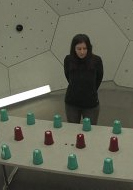Marta Kryven
Halifax, Nova Scotia
Position: Assistant Professor
Organization: Dalhousie University
Dr. Kryven is an Assistant Professor at Dalhousie University where she leads the Cognitive AI lab, and a Research Affiliate at Massachusetts Institute of Technology. Dr. Kryven has joined Dalhousie in 2024, after a post-doc at MIT Brain and Cognitive Sciences department. Her research integrates AI, cognitive science and experimental psychology to understand human perception decision-making, and creativity through the lens of computation. She uses the discovered insights into principles of neural computations to engineer more sample-efficient AI algorithms, that can understand people and work with people as partners in real-world. Her research has appeared in conferences such as NeurIPS, ICLR, Cognitive Sciences Society and journals such as Nature, PLOS Computational Biology and Cognitive Science.
Areas of Expertise:
Language(s):
My Work
What I do:
No other species possesses real-world intelligence quite like that of humans. Our ability to learn to use new tools with just a few examples, reuse knowledge to solve new problems, and interact with one another in complex ways, is the basis for much of our success. Recent decades have seen the emergence of impressive AI frameworks informed by biologically inspired design, such as Neural Networks, Reinforcement Learning and Neural Replay. However, we still lack efficient AI solutions for many real world planning and inference problems that are solved by people with relative ease. Understanding the computational cognitive principles by which human cognition is tuned to real-world tasks, and reverse-engineering these principles in AI, remains one of the most pressing engineering challenges. The goal of my research is to enable AI applications — such as autonomous robots, vehicles, and factory machines — to understand people, learn from our intelligence, and work with us as partners in the real world. Successfully creating such AI demands a highly interdisciplinary approach, integrating insights from diverse fields. My research combines theory-driven and methodological approaches from cognitive psychology, machine learning and statistics to develop principled computational models of human cognition in real-world settings, toward three broadly defined projects. (i) building computational models of how people efficiently make plans by leveraging prior knowledge of the natural world (ii) modelling how people combine inference under uncertainty and social cues to formulate and infer causal hypotheses (iii) modelling how individual differences in cognitive strategies emerge from experience, so that we can develop AI models that self-reflect, adapt, learn from human experts, and complement our skills
Ask me about:
Human cognitive psychology. How do people formulate hypotheses? How do we learn to navigate new environments? What makes people so much smarter than AI? How do we make plans? Computation and cognition. Which phenomena can be explain by the metaphor of cognition as computation? How do computations become disturbed in mental health conditions? Applied computational models. For example, how to interpret consumer choice through the lens of computational models? How to understand human eye-movements as foraging for information? Sample-efficient and human-aligned AI. How to make your AI application faster and need less data? Assessing Large Language Model behavior using tools from psychology/
Why me:
I am one of the very few experts in computation and cognition in Canada. Computational modeling of cognition is a rapidly growing interdisciplinary research area, which made tremendous impacts on accelerating scientific discovery, as well as on engineering groundbreaking AI applications in the recent decades. The North American Cognitive Computing market was USD 37.5 billion in 2019, USD 77.6 billion in 2022 and is projected to reach 185.62 billion by 2031. However, the majority of this market is still concentrated in large AI hubs in the USA.
Fun facts:
I use my understanding of AI, psychology, and engineering to design educational toys.
About Me
Sector: Academia (Post Secondary)
English proficiency: Read, Write, Speak
French proficiency: Read
Title: Dr.
Gender: Female
Disability: Physical

